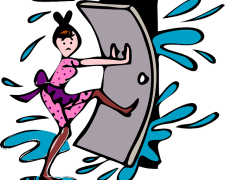What type of insurance claim are you really making?
During spring and summer, heavy rainfalls trench the Midwest and, unfortunately, some may experience water damage to their homes. Others may just come home to a leaking dishwasher or exploded pipe. No matter what the cause, water and flood damage are never convenient or cheap. One of the most common misconceptions about water damage, though, is that all of it is covered by homeowner’s insurance. That is simply not the case. Insurance companies make a distinction between types of water damage and it’s important to understand this to make sure you are covered and can file the right type of claim.
Flood Damage Insurance Claims
According to Federal Emergency Management Agency (FEMA), the definition of flood is, “a general and temporary condition of partial or complete inundation of 2 or more acres of normally dry land area or of 2 or more properties (at least 1 of which is the policyholder’s property)…” This can be caused by a variety of different sources, including:
- Overflowing water from a natural source (river, lake, etc.)
- Heavy rain that can’t be absorbed by soil
- Mudslide
When you think about flood damage, the simplest way to think about is that water is rising up from the ground into your home. If the home next to you has water in their home, as well, it is almost always a flood you are dealing with. Most homeowners who don’t live in a high-risk flood plain don’t consider paying for flood insurance necessary even though flooding is still possible. Either way, it’s important to understand both what is considered a flood and what is covered by flood insurance to know what type of claim will best suit your situation.
Water Damage Insurance Claims
In most cases, the standard homeowners insurance policy covers water damage. This does not rise from the ground, but rather is the result of water damaging the home before it hits the ground. Common examples of water damage include:
- Burst frozen pipe
- Broken plumbing pipe
- Leaking appliance
It’s best to take a look at your insurance policy before a disaster occurs to see if you are covered. In the event of an emergency, contact Guardian Public Adjusters. Your insurance company may offer an adjuster, but remember that they are working on behalf of the insurance company, not you. As a public adjuster, we work directly for your to make sure you are fairly compensated for your flood or water damage.

